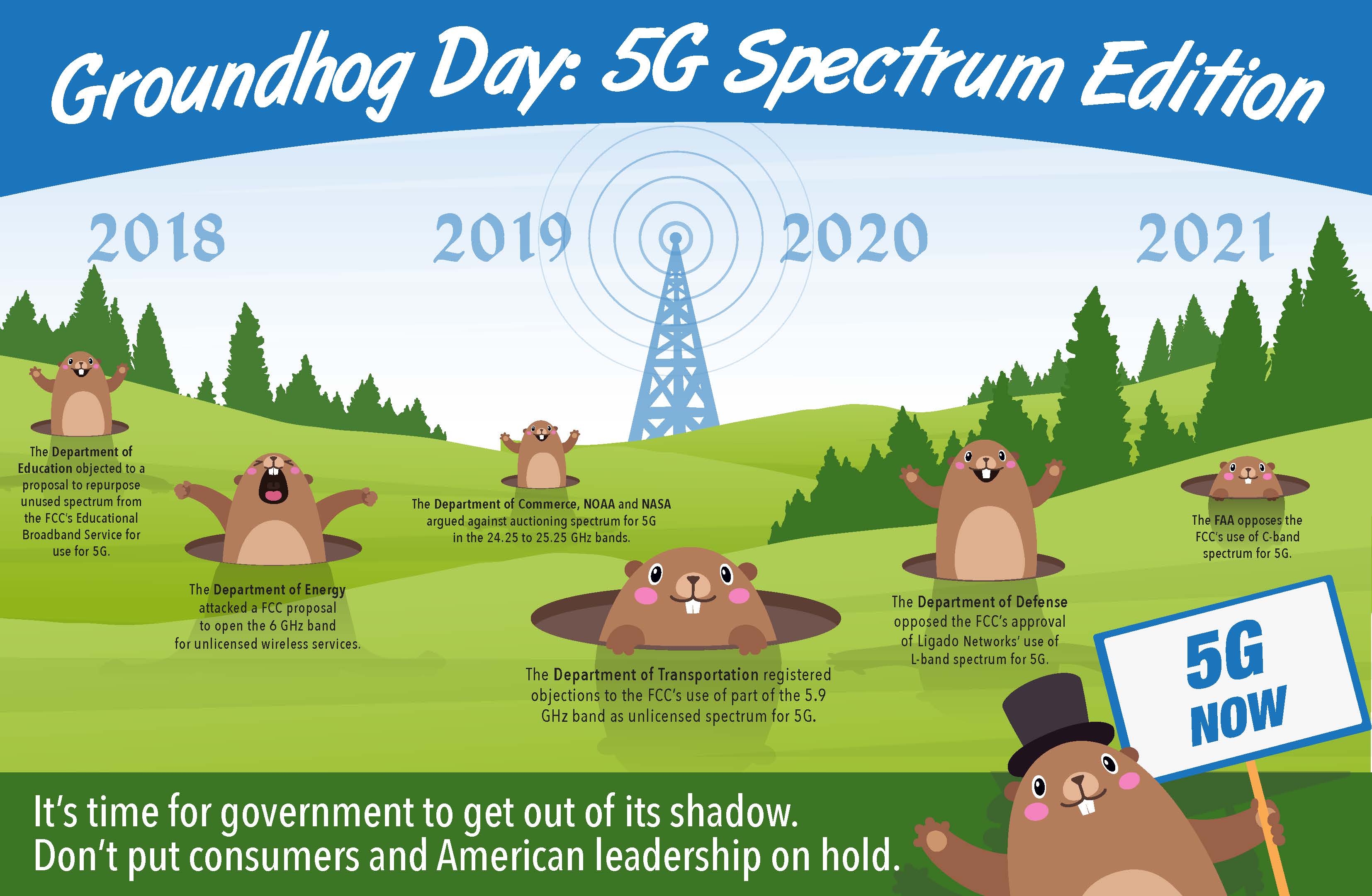| Here We Go Again: Another Federal Agency Interferes with the 5G Rollout |
 |
|
By Jeff Mazzella
Wednesday, November 17 2021 |
|
It’s like Bill Murray’s movie “Groundhog Day,” but not nearly as funny. Yet another federal agency - this time the Federal Aviation Administration (FAA) - is needlessly contesting 5G deployment, apparently more concerned with protecting its bureaucratic turf than allowing the United States to launch this essential wireless network innovation. The issue in question is spectrum allotment for 5G wireless, the spectacularly fast and powerful wireless service that will help determine winners and losers in the global economy. Countries that have 5G will thrive relative to those that don’t. The FAA’s immediate complaint centers on middle frequency C-Band spectrum, which is crucial to the full deployment of 5G in the U.S. The Federal Communications Commission (FCC), the agency with the actual expertise and experience necessary to decide spectrum issues such as this, has spent years studying the potential for 5G interference with aviation and has determined that establishing a 220 megahertz “guard band” around the portion of the C-Band aircraft use will more than protect them. The FAA has nevertheless decided to intervene in an area outside of its expertise, and contests the FCC’s determination. Based on highly dubious results of a single study, which the FAA hasn’t released for independent corroboration, it contends that 5G could somehow interfere with radio altimeters, the devices pilots sometimes use to gauge their distance above the terrain. The FAA has even issued an aviation warning to that effect, forcing wireless providers to pause 5G deployment just as they were ready to take a significant step forward in expanding service. Returning to the “Groundhog Day” analogy, this isn’t the first time a federal agency has butted heads with the FCC over spectrum allocation. Unfortunately, government agencies are loathe to surrender control over anything they consider within their domain, which in this case includes what they perceive as their incumbent spectrum rights. While the FCC remains focused on attempting to fairly allocate spectrum among all users, agencies including the U.S. Departments of Transportation, Education, Defense and Energy have all objected to what they consider encroachment upon a portion of their spectrum allocation, regardless of how their intransigence will affect the public good. The FAA’s objection is especially aggravating because no evidence exists to suggest any substantive threat from 5G to altimeters. In fact, 5G base stations are already in place in the U.S. and 40 other countries, with no incidents of interference. Clearly, if there were any issues they would have surfaced by now. The FAA itself acknowledged that no real-world demonstration of 5G and aviation interference has surfaced, but it went right ahead with its warning anyway. Alarmingly, the FAA’s timing could not be worse. To wit, our Chinese competitors continue to forge ahead with their 5G network deployment, but without the sort off internal bureaucratic turf wars in which the FAA is engaging. One cannot imagine any Chinese government agency being allowed to block the development of what is perhaps the most important new technology in the world today. Accordingly, the FAA must come to its senses and realize the damage that it’s doing with its baseless claim. The facts are clear: Multiple studies conducted by the FCC and reams of technical data support the conclusion that 5G presents no substantive threat in the way the FAA speculates. Moreover, look at the experience of other countries: Japan has some 90,000 5G base stations in place with only a 100 megahertz guard band and it has had no problems with aviation. What will it take to get the FAA to come to its senses? We’ve seen this movie over and over, and it’s time for it to end. The FAA must withdraw its baseless claim and get out of the way so that wireless providers can build the 5G network our nation needs. The stakes are too high for bureaucratic territorialism to undermine American security, prosperity and technological preeminence. |
Related Articles : |
























